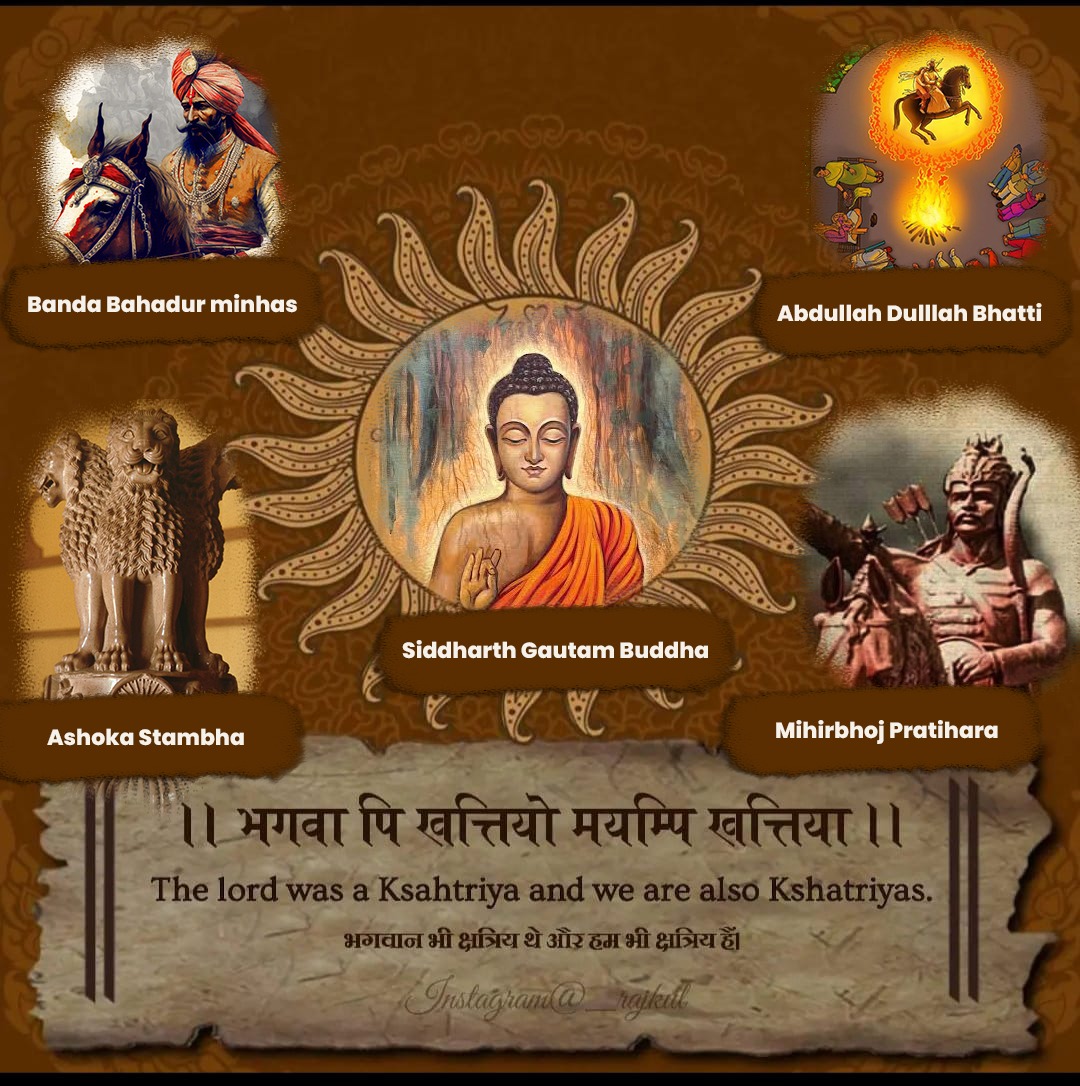Oh Kshatriya ! Embrace your Heritage Fully To Fully Own your Future
Oh Kshatriya ! Embrace your Heritage Fully To Fully Own your Future, Don’t Limit yourselves to Religion & Region
The Hindutva chauvinists implore different castes to attend RSS shakhas to receive training into Kshatriyahood (or to make them intellectual Kshatriyas, as brahmin politician Tejasvi Surya terms). How conveniently, the Brahmin and upper OBC leadership of RSS has reduced our Kshatriya identity to certify their version of patriotism.
However, what is more chilling than the grotesque appropriation of our heritage is the sight of poor Kshatriyas or Rajputs flocking to attend these shakhas lest their patriotism is questioned by their peers from these groups. Do we need certifications from such people, whose own ancestors barely bled for the land and only rejoiced at the fruits reaped by Kshatriyas and subalterns ? It is a disgrace to our ancestors who served and defended everyone in their domain, irrespective of caste or religion. It is not an overstatement that our thousand years of military, cultural and social contributions to the region always outweighs that of those who seek to certify us. Regardless of all their sermons of nationalism and threats to proclaim those defying them as “anti-national”, the pristine aim of Hindutvadis is to establish Brahmin-hegemony, for which they often bend backwards before caste-hooliganism of Jats and Goojars.
Similarly, we the children of Buddha do not need certificates of Social justice and egalitarianism from opportunistic Subaltern politicians and intellectuals who align with the same lathait “chaudharies” who have cornered the rights of the mool OBCs and are also unquestionably the biggest oppressors of the SCs & STs. It must be remembered that no non-subaltern community contributed to Social Justice more than us. Unfortunately the lands given by our forefathers for the marginalized landless communities and the OBC reservation implemented by our very own VP Singh for artisanal landless communities, were hijacked by landed dominant “chaudharies” due to political opportunism of subaltern leaders. How many Jat and Ahir landlords donated lands to the landless SCs & STs? What was the role of Jats in Mandal implementation? When VP Singh Gaharwar and Arjun Singh Baghel risked their political careers for implementation of OBC reservations, Jat Raja Vishwendra Singh and Jat netas like Devilal and Bhajanlal were staunchly opposing OBC reservations. But today, they have shamelessly marginalized the original OBCs. So why are the mool OBCs SCs & STs aligned with them & they see us as enemies? The answer is political power which they have & we don’t. Why we don’t have political power despite such a huge population, is worth pondering.
Therefore today, neither Nationalism nor Social Justice can be priority of Kshatriya leadership, both intellectual and grassroots. Today, the vast Kshatriya masses, particularly the youth, is economically suffering, politically directionless and socially backward. It is not just a social responsibility of the educated and privileged sections of Kshatriyas but also their moral obligation to stand up for their under-privileged brethren – guide them socially, educate them, uplift them economically and organize them politically. However, no intellectual leadership and social leadership of any society is possible without carefully scrutinizing its history and analyzing the social, political and economic aspects affecting its present.
Persistent study of History & Politics affecting Society is a pre-requisite for the Intellectual & Social leadership of any Community. The mental bondage among Kshatriyas towards Brahminism and Hindutva has remained the biggest fatal flaw of Kshatriya politics, impeding the rise of an independent pan-Indian (or pan-global) Kshatriya Intelligentsia and strong Kshatriya leadership. Let us discuss the boundaries of our identity and the expanse of our lived history, that our brahminized minds nauseate talking about.

In “Poonch: India’s Invincible Citadel“, Brigadier J S Grewal highlights the history of Rathore Sultanate of Poonch city of Jammu and Kashmir. Poonch was ruled by Muslim Rathore Rajputs from the late 16th century to the rise of Dogra rule. This small piece of information is critical to understand the vast expanse of our geographical and religious heritage, and how our understanding of our own history has been limited due to the Brahminical worldviews.
Similarly, adjacent to Poonch is Rajouri ,where the Sultans were Tomar Rajputs of Jarral branch (khamp). Almost 180 km away from Poonch was the princely state of Bhimber in Pakistan, whose Sultans were Katoch Rajputs of Chhib Khamp. Travelling south to the Salt Range region of Pakistan, we may find the Janjua Rajputs – who (like Tomars) are descendants of the Arjunayanas. Similarly, if we proceed to the area of Sialkot and Pindi Bhattiyan, we find a good population of Muslim Bhatti Rajputs.

If we travel further south to the Indian Punjab’s Doaba region, we find Sikh Kshatriyas in Hoshiyarpur and Jalandhar (Adhampur tehsil). The Ghorewaha Khamp of Kachhwaha is found in Nawashahar and Rahon (both of which fall in Bhagat Singh Nagar) of Punjab – among them those who were Muslims went to Pakistan and those who were Hindus remained here.
This is not to belie the fact that each of these religions, Islam, Sikhism or Brahminism, has had a impeding effect on the Kshatriya politics and spirituality. But it cannot be denied that this is the extent of our tribal population (that includes Sikh & Muslim Rajputs) and this is the extent of our heritage, which we must unanimously embrace.
Nevertheless Our philosophical history is linked to Buddhism, Jainism and Shramana literature, more than it is linked to Brahminism. Since the philosophers of these traditions were predominantly Kshatriyas and subaltern castes, the canonical literature of these traditions were penned in Prakrit and Pali. On the other hand in Sanskrit literature written by Brahmins we kshatriyas are only characters in the story but the point of view always remains of Brahmins – similar to today where our relegated to the status of characters in films and media promoting the views of the Brahmins.

All this is being shared with you so that you know how vast our population is, what philosophy our forefathers gave, how Kshatriyas started accepting Brahmin philosophy till the Gupta period, which gradually ended their intellectual sovereignty . The best example of this is the celebration of Parshuram Jayanti by Kshatriyas these days (we very easily accept the lies of Brahmins instead of questioning them).
As a result, today almost all kshatriya organizations act as flagbearers of Brahminical supremacy, committing the blunder of searching their Kshatriya history and responsibility in Brahminical texts (the books in which Kshatriyas are relegated to the status of servile watchmen). After having trapped their own people into an unintellectual mental trap, these very unscrupulous people further mislead the society into a bonded labor of brahmins by perpetuating that “there is no option but to support the Brahmins and support the BJP”. This is not to suggest that we stick with anti-BJP parties either – surely the Rajputs were initially pushed towards BJP not because of ideology but rather due to hostile policies of Congress’s brahmin-bania eilte (Both parties undoubtedly represent the interests of brahmin-banias).
Therefore, the Kshatriya youth must read and understand the expanse of their society with an independent mindset before envisioning any independent Kshatriya politics. Without understanding the ancient, medieval and modern history of the Kshatriya society, without understanding the diversity of its population, without understanding the politics of the Brahmin Baniya intellectual class towards you, we cannot develop a strong ,modern and independent ideology.
Expecting a strong smart and independent intellectual and political leadership without embracing the community’s diversity and history fully, is self-betrayal. Besides, the human society is increasingly moving towards globalization, breaking national barriers. Further, without a sovereign ideology it is utterly dishonest to discuss social welfare.

